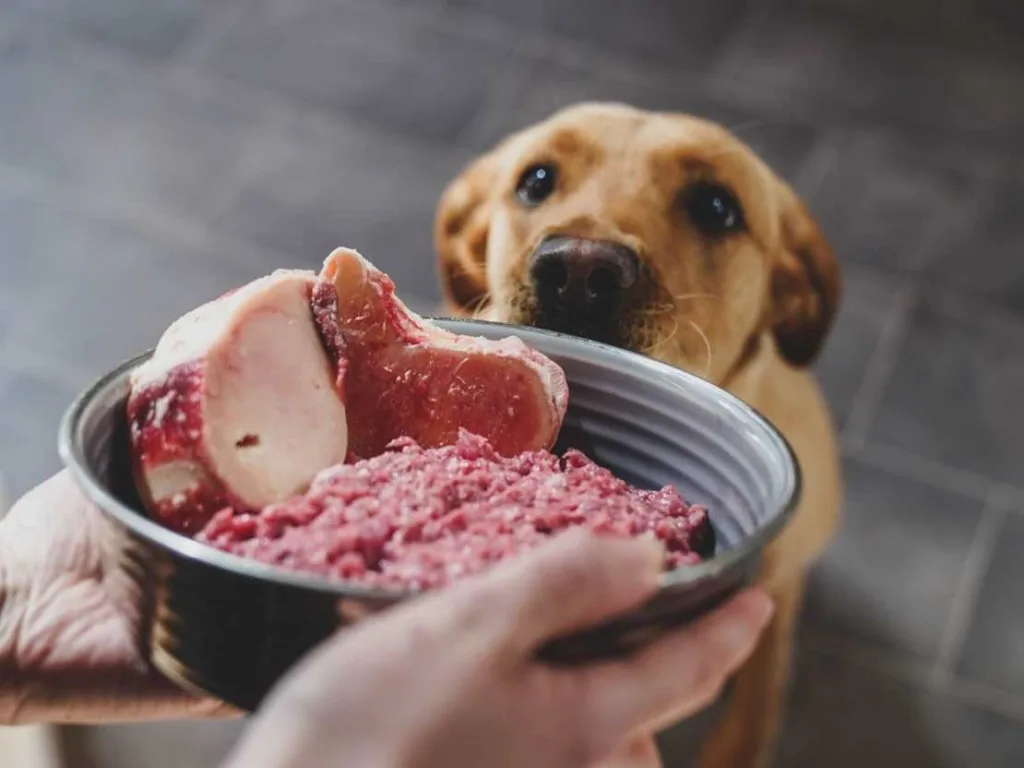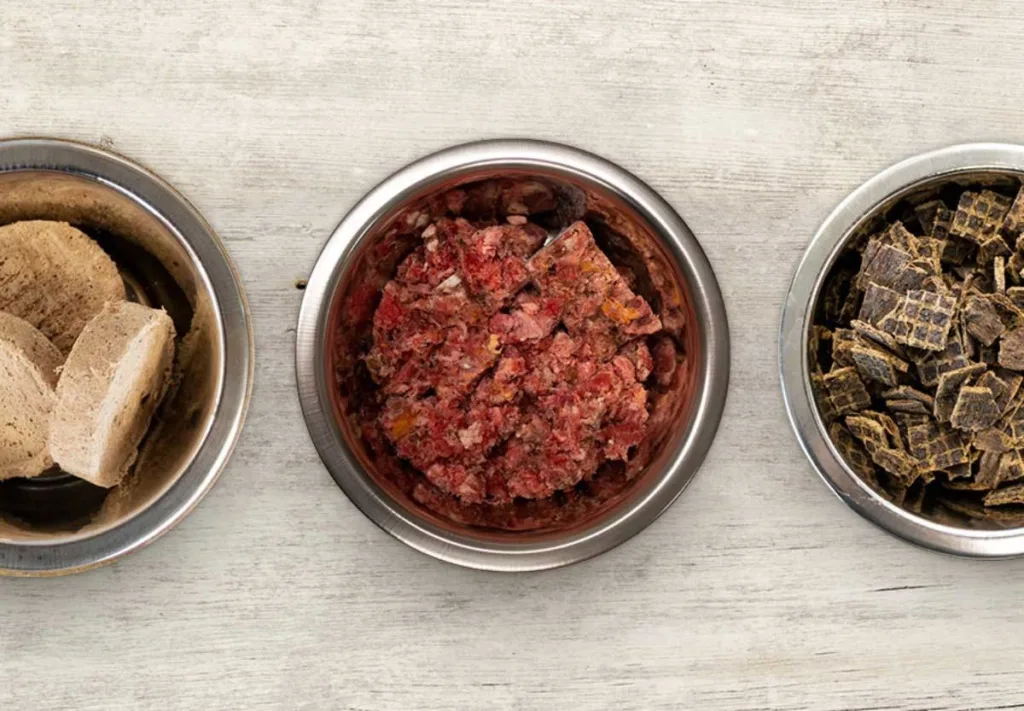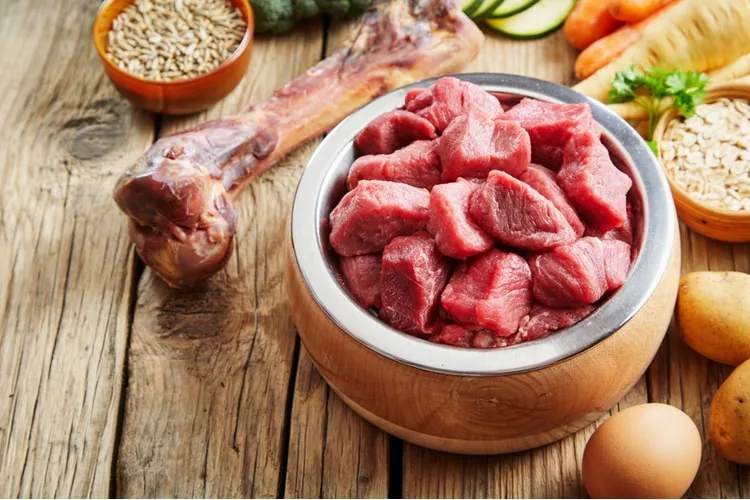Has your dog been constantly scratching, licking their paws, or suffering from diarrhea? These could be signs of an underlying food allergy. If your furry friend seems to always have itchy skin or upset stomachs, a raw food diet may be the natural solution.
In this post, we’ll explore the growing concern over canine allergies, the benefits of raw diets for dogs, tips for transitioning to raw, and real-life success stories. You’ll learn how a balanced raw food diet could alleviate your dog’s allergy symptoms and dramatically improve their health.

A Distressing Trend: The Rise of Dog Allergies
Allergies are on the rise for our canine companions. Up to 10% of all dogs suffer from food allergies, typically to common proteins like beef, dairy, chicken, eggs, wheat, and soy. Environmental allergies to dust mites, grass, mold and more can also make your dog miserable.
Excessive paw licking, flatulence, chronic ear infections, skin irritations, and constant scratching are all telltale signs your pup may have sensitivities. Left untreated, allergies can impact your dog’s quality of life and lead to secondary infections.
The good news? There are natural solutions to explore. Increasingly, holistic veterinarians and pet owners are finding success managing allergies through raw food diets. Homemade raw diets can minimize processed ingredients and potential triggers.
A Closer Look: Common Dog Allergies
Allergies occur when your dog’s immune system overreacts to a typically harmless substance. While any dog can develop allergies, certain breeds seem more prone. Retrievers, German Shepherds, Poodles and Cocker Spaniels often top the list.
Food allergies typically result in skin irritation and gastrointestinal issues like vomiting or chronic soft stools or diarrhea. Dogs can develop allergies to protein sources or carbohydrates like wheat and rice. Some experience adverse reactions to additives like preservatives, flavorings or dyes found in commercial dog foods.
Environmental allergies lead to itchy skin and chronic ear issues, often worsening seasonally when allergens like pollen are high. Due to lifestyle factors like diet and habitat, our dogs face higher allergy risks than their wolf ancestors.
Could processed and unnatural kibble be contributing? Let’s explore the promising benefits of switching dogs to a balanced raw food diet.

Powerful Nutrition: The Benefits of Raw Food for Dogs
More dog owners are embracing raw food diets to nourish their dogs naturally and alleviate allergy issues. Raw diets aim to mimic the ancestral wolf diet before domestication – an ideal blueprint for health. These diets feature uncooked meats, bones, organ meats, fruits, vegetables and healthy fats.
So why is raw worth a closer look for allergic dogs?
- Raw food diets eliminate potentially irritating grains like corn, wheat and soy. Dogs lack the enzymes to properly digest grains.
- Cooking depletes vitamins, antioxidants and enzymes. Raw ingredients provide nutrition in their whole, nutrient-rich form.
- Unprocessed raw meats contain natural moisture and proteins closer to a dog’s biological needs. This supports healthy muscle growth and organ function.
- Chewing raw meaty bones provides mental stimulation while cleaning teeth and gums.
- Raw organ meats like liver provide iron, vitamins A and B, zinc, copper and enzymes often lacking in commercial diets.
- Omitting processed ingredients may reduce inflammation tied to allergies and skin issues. Rich omega fatty acids can nourish skin and ease itching.
Success Stories: Real Dogs Helped by Raw Diets
Skeptical if raw is right for your dog? Just ask Miko’s owner, Mina. Miko struggled with chronic itching, ear infections and diarrhea. Multiple vets prescribed antibiotics, steroids and hydration therapy without success.
Mina transitioned Miko to a balanced raw diet under veterinary guidance. “Her coat is softer, she sheds less and her energy has increased,” Mina says. Miko’s skin is less irritated and her stools are now solid.
Jasper, a Golden Retriever, began having food reactions at 10 months old. “He’d get welts on his belly after eating, lick his paws until they were bright pink and have awful diarrhea,” says Jasper’s owner Amy. After switching to a raw food diet, Jasper’s symptoms cleared up. “His coat shines, his eyes are bright and he’s full of energy,” Amy reports.
These success stories demonstrate the transformative effects of raw nutrition for dogs plagued by allergies. As pet owners eliminate irritants and nourish their dogs naturally, they see dramatic improvements in health and happiness. Now let’s explore how to create a balanced raw diet.

Crafting a Nutritious Raw Dog Diet: Key Tips
Interested in trying raw? Creating a balanced diet takes research and planning. Work closely with your vet and introduce changes gradually. Here are some tips:
Pick Quality Proteins
Beef, bison, lamb, turkey, duck, rabbit and mackerel offer digestible protein sources. Organic, grass-fed meats are ideal. Rotate proteins to identify food intolerances.
Include Organ Meats
Liver, kidney and heart provide crucial nutrients. Aim for 5 to 10% of the total diet.
Add Raw Bones
Chicken leg quarters, turkey necks and pork or lamb ribs offer edible bones. Never feed cooked bones, as these can splinter.
Include Low-Oxalate Veggies
Low-oxalate veggies like zucchini, broccoli and celery are less likely to irritate sensitive dogs. Light steaming can enhance digestibility.
Supplement with Healthy Fats
Fish, coconut, hemp and olive oils provide anti-inflammatory omega-3s.
Avoid Processed Foods
Don’t feed kibble, canned food or processed treats during the transition to identify problem ingredients.
Consult Your Vet
Work with your vet to design a balanced raw diet tailored to your dog’s needs and allergies. Monitor for potential nutritional gaps.
With planning and patience, you can create a wholesome diet to nourish your dog naturally and potentially resolve allergy issues in the process.
Transitioning Your Dog to a Raw Food Diet
Ready to make the switch? Take your time transitioning. Cold turkey changes can upset your dog’s digestion. Follow these tips:
Mix kibble with raw
Gradually introduce raw food while decreasing your dog’s regular kibble over 2 to 3 weeks.
Keep portions small
Divide daily raw amounts into 3 to 4 tiny meals at first.
Expect softer stools
This is normal at first as your dog’s digestion adjusts. Make sure plenty of water is available.
Add digestive enzymes or probiotics
These supplements ease digestion and reduce stomach upset.
Stick to a schedule
Feed raw meals at consistent times to support the transition process.
Avoid other food changes
Don’t introduce new proteins or treats during the transition.
Be patient
It can take 2 to 3 months for your dog’s body to fully adapt to raw food. Monitor their health and adjust as needed.
While every dog adapts to raw diets differently, following these tips can make the transition smooth and successful.

Raw Diets Transform Allergy-Prone Dogs: Real-Life Cases
Still not convinced of the allergy and skin benefits of raw diets? Just look at Django and Luna!
Django – Food Allergies
Django suffered from chronic diarrhea, vomiting and itchy skin. Extensive vet tests revealed food allergies were the culprit. Commercial dog foods all seemed to trigger flare-ups.
After transitioning Django to a customized raw diet, his owner Hillary noticed astonishing changes. “His coat looks so shiny and soft now, he has tons of energy, and his stomach issues cleared up,” she says. Django continues to thrive on his new raw diet tailored just for him.
Luna – Environmental Allergies
Luna, a Boston Terrier, constantly scratched and chewed at her paws and skin. The vet diagnosed environmental allergies. Luna’s owner Katie says, “We tried special shampoos and medications, but nothing worked. Poor Luna was miserable.”
On a friend’s suggestion, Katie introduced raw food. After about one month, Luna’s compulsive scratching and licking reduced dramatically. “Her coat looks healthier than ever before. She seems so much more comfortable now,” Katie reports.
These inspiring case studies demonstrate the real-world results regular people see when they switch their dogs to raw food diets. Both Django and Luna found allergy relief once their owners eliminated inflammatory processed foods. While raw diets don’t work for every dog, they provide a compelling natural option.
Possible Precautions with Raw Feeding
While evidence shows raw diets benefit many dogs, they aren’t for every pooch. Dogs with liver or kidney disease may need cooked food that’s easier to digest. Raw diets may also not address allergies unrelated to food, like environmental triggers.
Work with your vet to see if raw or home-cooked food makes sense for your dog. They can help you avoid nutritional imbalances. Monitor your dog closely when transitioning foods.
Some additional precautions to keep in mind:
- Raw diets may expose dogs to new allergens like meats they’ve never eaten before. Keep a food journal to identify problem ingredients.
- Raw meat and eggs pose a minor bacterial risk. Always wash your hands and bowls thoroughly. Don’t leave raw food sitting out for more than two hours. Monitor your dog for foodborne illness symptoms.
- Adding too much bone can lead to constipation. Find the right bone ratio tailored to your dog.
While these risks are low, they merit consideration before deciding if a raw diet aligns with your dog’s needs and your own comfort level. Discuss all dietary options with your veterinarian.
Give Your Dog the Gift of Health
If your pup suffers from ongoing digestive distress, mysterious skin irritations, chronic ear infections or intense itching, allergies could be the culprit. Traditional treatments like steroids and antibiotics only mask symptoms. They fail to address the root cause.
Transitioning your dog to a nutritionally balanced raw diet free of grains, fillers and artificial additives could profoundly improve their health. Unprocessed raw foods allow nutrients to shine in their natural forms. This nourishment may lessen inflammation and allergic reactions.
While the switch takes patience and adjustment, many dog owners report seeing dramatic results in skin, coat, energy levels and alleviation of gastrointestinal distress. By offering your dog relief naturally through food, you can strengthen your bond and enable them to thrive happily.
Want to learn more about the benefits of raw diets? Check out my eBook on raw feeding tips or subscribe to my newsletter. I’ll be sharing more allergy success stories and exploring related topics like supplements for dogs. You and your pup have nothing to lose – here’s to healthier, happier days ahead!
Thank you for reading this post, don't forget to subscribe to our free newsletter
!

